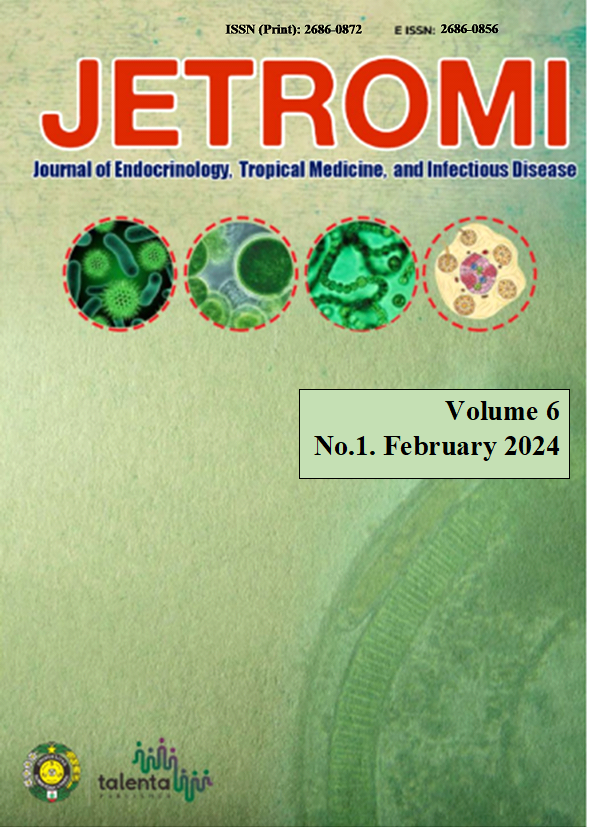Relationships Between Age of Onset, Seizure Frequency, And Disease Duration with Cognitive Function in Epilepsy Patients at the Neurology Clinic of H. Adam Malik Central Hospital, Medan
DOI:
https://doi.org/10.32734/jetromi.v6i1.14894Keywords:
Epilepsy, Cognitive Function, MoCA-InaAbstract
Background: Cognitive function disorders often occur in individuals with epilepsy. The decline in cognitive function in epilepsy patients can be caused by various factors, including age of onset, seizure frequency, and duration of the disease. This study aims to investigate the relationship between the age of onset, seizure frequency, and disease duration on the cognitive function of epilepsy patients at the Neurology Outpatient Clinic of Haji Adam Malik General Hospital in Medan
Method: The chosen research design is a cross-sectional analytic. The study was conducted at the neurology outpatient clinic of the Adam Malik Central General Hospital in Medan. The samples used were patients diagnosed with epilepsy at the Neurology Outpatient Clinic of Adam Malik Central General Hospital in Medan, aged 18-65 years, and without any other medical conditions aside from epilepsy. The study involved 35 subjects.
Result: The majority of the research subjects are aged 18-45 years (94.3%), with more males (51.4%) than females. Most have a high school education background (48.6%), and the largest group is unemployed (62.9%). The most common age group at onset is 0-18 years (48.6%). The majority of subjects experience seizures in the rare category (less than 1 time per month) at 62.9%. Most subjects have a disease duration of less than 15 years (65.7%). The majority of epilepsy patients at the Neurology Outpatient Clinic of H. Adam Malik Hospital (52.1%) have abnormal cognitive function based on the MoCA-Ina test results. Statistical analysis was conducted using the chi-square test and multivariate analysis with logistic regression. The chi-square test results revealed a significant relationship between age of onset and cognitive function (p=0,008), a significant relationship between seizure frequency and cognitive function (p=0,004), and a significant relationship between disease duration and cognitive function (p=0,012). The multivariate analysis results indicated that disease duration had a significant relationship with cognitive function, with an odds ratio of 0,081 (p-value=0,037, 95% CI 0,008-0,862).
Conclusion: There is a relationship between age of onset, seizure frequency, and disease duration with the cognitive function of epilepsy patients at the Neurology Outpatient Clinic of Haji Adam Malik General Hospital in Medan
Downloads
Downloads
Published
Issue
Section
License
Copyright (c) 2024 Journal of Endocrinology, Tropical Medicine, and Infectious Disease (JETROMI)

This work is licensed under a Creative Commons Attribution-NonCommercial-ShareAlike 4.0 International License.
The Authors submitting a manuscript do so on the understanding that if accepted for publication, copyright of the article shall be assigned to Journal of Endocrinology, Tropical Medicine and Infectious Diseases (JETROMI).
Copyright encompasses exclusive rights to reproduce and deliver the article in all form and media. The reproduction of any part of this journal, its storage in databases and its transmission by any form or media, will be allowed only with a written permission from Journal of Endocrinology, Tropical Medicine and Infectious Diseases (JETROMI).








